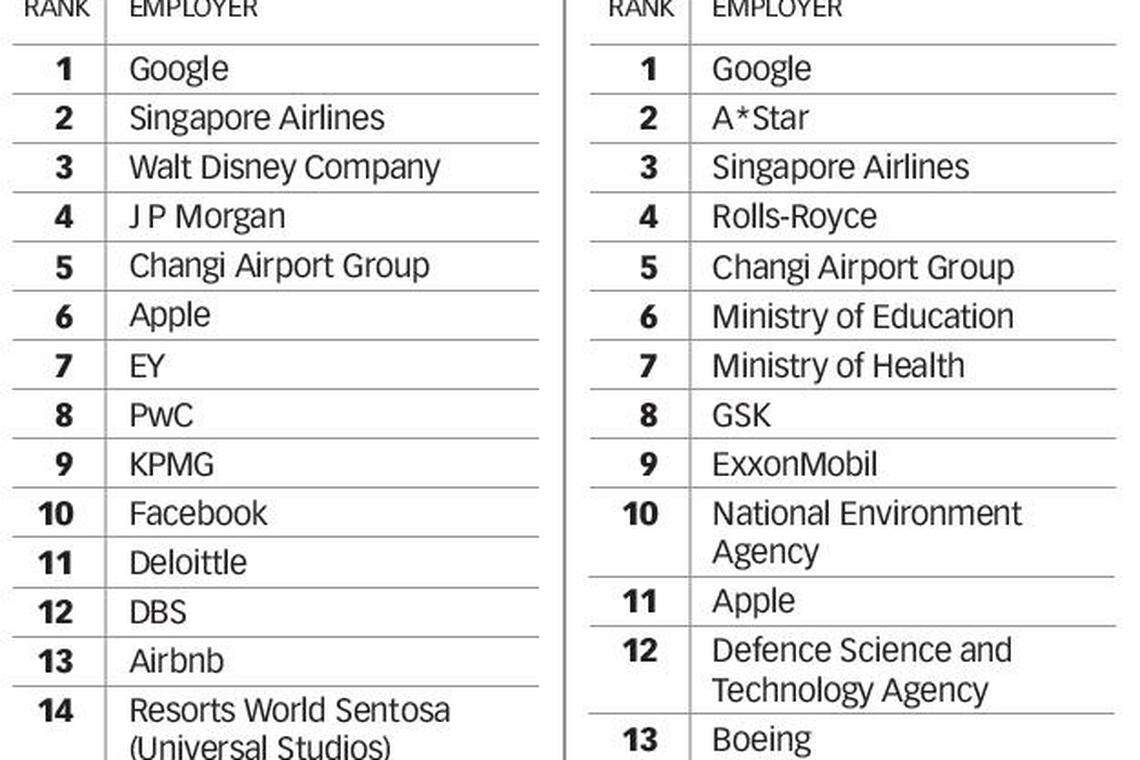Google's job security, work-life balance top draw for local undergrads
Singapore
FOR the third straight year, business and commerce students in Singapore's four main universities picked Google as the best company to work for. The US tech giant also knocked down the government's leading scientific research agency, A*Star, to second place to regain top choice among engineering and natural sciences students in this year's ranking of 100 ideal employers in Singapore.
And attractive pay and perks were not the carrots that make Google such an enduring hot favourite with the students of Singapore Management University, Singapore Institute of Management, Nanyang Technological University and National University of Singapore. Two in three of the 8,800 business and engineering under-grads polled by employer branding firm Universum in its Top 100 Ideal Employers' rankings say work-life balance is their number one priority when looking for a job, as it has been for students polled for the rankings in the past five years.
After work-life balance, the next most desired career goal is job security and stability, reinforcing the findings in last year's poll and indicating, according to Universum, that it remains "a genuine and legitimate" concern among young millennial talent in Singapore.
Over half (around 54 per cent) of the students ticked as their goal "to be secure or stable in my job".
"Organisations can no longer ignore the impact of the millennials," says Rachele Focardi, Universum's senior vice-president for Talent Strategy. "Employers who fail to understand that they want work to be part of who they are, not just a way to make a living ... are bound to face significant challenges when it comes to securing their future talent pipeline."
Business/commerce and engineering/natural sciences students differ in the third most important career goal, with the former aspiring to be "a leader or manager of people; engineering students, on the other hand, want "to be dedicated to a cause or to feel that I am serving a greater good".
Salary expectations have actually declined since last year, according to the poll. Down an average S$1,251 from an annual pay of S$40,551 to S$39,300. Male students still expect to be paid more than females, S$41,294 against S$38,444. But the gap is narrowing, with the difference shrinking from S$3,285 in 2016 to S$2,850 this year.

"Although the study doesn't directly explain the reason for the lower salary expectations, recently published government data on layoffs and employment rates certainly suggest a more challenging talent market for graduates, and this has likely contributed to this pessimistic view," Universum said.
Some industries known for high pay are also not as popular as before. Banks and financial services, always popular with business students, males in particular, has been losing its shine in the past five years - though banking remains the "most preferred" industry to enter, with J P Morgan (4th), DBS (12th) and OCBC (20th) still high in the latest rankings for the business students.
Universum says banks have dropped 25 ranks on average, from 15th in 2012 to 40th in 2017.
"Despite a high proportion of business students selecting banking when directly asked which industry they want to work in, they tend not to select banks as their most ideal employers." The employer branding firm added: "This indicates banks are either not good at providing the sorts of employment experiences this talent seeks, or are not good at communicating it."
The energy industry's average ranking fell 13 ranks from 2016 because of the steep fall in oil prices. Companies like Schlumberger and BP are no longer as attractive as before.
Among emerging industries most preferred by both business and engineering students this year are educational and scientific institutions (18%), healthcare services (13%) and arts, entertainment and recreation (10%). Some of these, especially the latter, are favoured more by the female students.
Both business/commerce and engineering/natural sciences students also tend to pick foreign (54% and 35% respectively) companies and organisations as ideal employers. The preference for local employers are 12% and 11% respectively. This is reflected in the rankings by business students, where eight of the top 10 preferred employers are foreign.
Among local employers, the students, mostly those in engineering and natural sciences courses, lean toward the government (10% business students and 17% engineering students) and state-owned companies and agencies (12% and 11%).
The only two local employers in the top 10 rankings by business students are government-controlled Singapore Airlines and Changi Airport Group. The top 10 rankings by engineering students include Singapore Airlines and Changi Airport Group; government agencies A*Star and National Environment Agency; as well as the Ministry of Education.
The IRAS (from 64 in 2016 to 54 in 2017), the Ministry of Culture, Community and Youth (67 to 59) and the Ministry of Health (83 to 76) are also among those which made the biggest jumps in this year's rankings.
Homegrown Hyflux jumped 10 ranks to 111. US cigarette and tobacco manufacturer Philip Morris International scaled 16 ranks to top the list of "greatest gains" in ranking.
Singapore Petroleum Company (from 91 in 2016 to 109 in 2017) Singapore Technologies Engineering (101 to 119), Defence Science & Technology Agency (98 to 113) and the Ministry of Social and Family Development (56 to 69) were among this year's biggest losers.
BT is now on Telegram!
For daily updates on weekdays and specially selected content for the weekend. Subscribe to t.me/BizTimes
International
Fed survey cites inflation, US election as key financial stability risks
Oil prices steady after Iran plays down reported Israeli attack
G7 pledges swift aid for Ukraine, seeks to calm Middle East
H5N1 strain of bird flu found in milk: WHO
China moves to boost foreign investment in domestic tech companies
Xi orders China’s biggest military reorganisation since 2015
